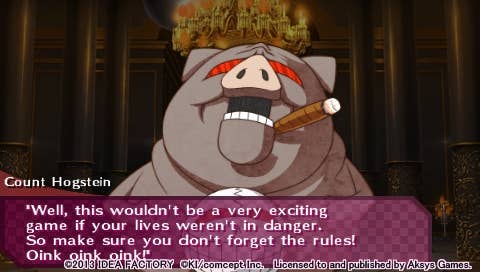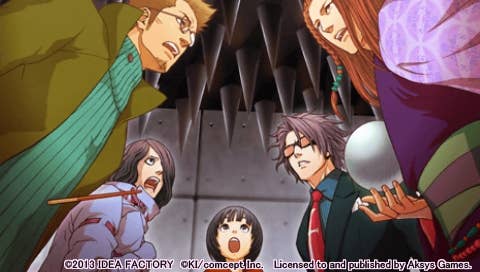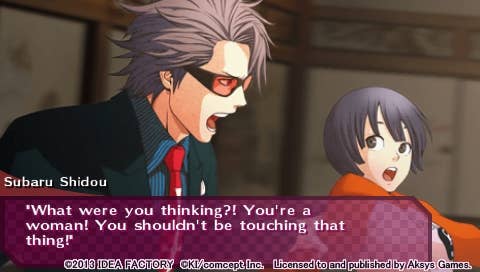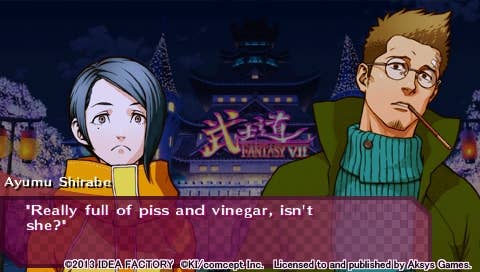Sweet Fuse: At Your Side Review
A brand new PSP game? In 2013? Yes, not only is Sweet Fuse a thing that exists, seemingly against all odds, but it's rather good, too. Pete spends some time with Keiji Inafune's niece and her army of suitors as the dastardly Count Hogstein attempts to make trouble for the man behind Mega Man.
This article first appeared on USgamer, a partner publication of VG247. Some content, such as this article, has been migrated to VG247 for posterity after USgamer's closure - but it has not been edited or further vetted by the VG247 team.
In all my time playing video games, I've dated significantly more virtual women than men.
That's not to say the option hasn't been there, of course -- the surprisingly passionate fanbase of Garrus from Mass Effect will attest to that, and he isn't even human -- but it's reasonably fair to say that, at least in mainstream gaming, the assumption is more often than not that the player is both heterosexual and male, or at least someone who doesn't mind playing as a heterosexual male character.
Thank heavens for developers of "otome games," then, who specifically tailor their games to heterosexual women and, again, people who don't mind playing as heterosexual female characters. Otome games are reasonably commonplace -- relatively speaking anyway -- in the open, boundary-free marketplace of PC gaming, with developers such as Winter Wolves and Sakevisual specializing in the genre, but it's still relatively rare to find an honest-to-goodness otome game on consoles and portables outside of Japan.
All this is a preamble to the fact that Sweet Fuse is an otome game, and one which I was very curious to try for a variety of reasons. Firstly, the ridiculous premise -- Mega Man creator Keiji Inafune's niece teams up with six guys to thwart the plans of a terrorist pig in her uncle's game-inspired theme park -- was immediately intriguing. Secondly, I'm a fan of the visual novel medium generally, and find the PSP/Vita to be a great fit for this type of game -- a handheld device is much more friendly to bedtime reading than a hulking great laptop! Thirdly, I was curious to step out of what I freely admit is my "comfort zone" to try something a little different from what I usually find myself gravitating towards -- specifically, in this case, a relationship-focused game in which I play a heterosexual female character rather than the more familiar experience of playing a heterosexual male (or, less frequently, a homosexual female) character.
I wasn't disappointed.

Sweet Fuse's premise gives it a convincing -- if self-consciously silly -- reason for its plot to be more than just "simpering high school girl lusts after one of six different men." While the first few chapters of the game unfold very similarly regardless of which of the main cast members you're attempting to court, the latter half of the game is unique to each character. And it's in this latter half that things truly get interesting, with each character revealing a different part of the overall plot that all fits together when you've seen them all.
Sweet Fuse's cast is a diverse and unusual bunch from a variety of different backgrounds, you see, ranging from the cold, stern detective Shidou to the laid-back mystic Urabe. While there are recognizable tropes clearly visible along the way, the fact that these potential paramours are drawn from the stock male character playbook rather than the usual bishoujo characters seen in visual novels immediately makes them intriguing -- particularly as the game isn't set in the usual anime/visual novel slice-of-life school setting. Saki, the protagonist, may be a high school girl herself, but her prospective suitors run the gamut from naïve teenage idol to cynical middle-aged Pocky-chewing journalist. And don't worry, the game specifically acknowledges and addresses the age difference thing whenever it comes up -- though naturally, to explain how that is resolved would constitute a spoiler, so I'll leave it for you to discover.
In fact, the seeming weak link in the cast is Saki herself, who is simply not a very interesting character at first glance. This is due in part to the game's narrative structure, and is also probably deliberate. It's not at all unusual for the protagonist in this sort of game to be a vaguely defined character intended for the player to project their own personality on to -- many visual novels and dating sims, including this one, even go so far as to leave the protagonist's lines completely unvoiced so as to avoid any dissonance between the depiction of the protagonist and the player's self-perception. It works to a certain degree, too; because some of the choices you can make throughout the game have wildly differing outcomes, you can essentially help mold Saki into the type of character you want her to be, be it demure, shy schoolgirl or spunky, ass-kicking heroine who holds the whole team together. By the end of the game, depending on which character you've chosen to pursue, Saki will be a noticeably different person.
You can mold Saki into the type of character you want her to be, be it demure, shy schoolgirl or spunky, ass-kicking heroine.

Sweet Fuse positions itself as a visual novel with puzzles, which might perhaps make it sound somewhat akin to the visual novel/adventure hybrid gameplay found in the Zero Escape series, but this isn't altogether accurate. In fact, although the game's narrative revolves around the cast deciphering antagonist Hogstein's devious traps and puzzles, the actual "hands-on" puzzle solving you'll be doing in the game is kept to a bare minimum, and most of the time you'll be simply watching the scene unfold -- often, if you're anything like me, accompanied by gnashing your teeth at how dumb they're being. This experience will be nothing new to longtime visual novel fans, of course -- we're talking about a medium that would rather represent, say, a battle between a giant robot and Cthulhu with reams of text rather than an animation or interactive combat sequence, after all -- but it may be jarring to those expecting to be doing a little more interacting and traditional adventuring along the way.
There are a few examples throughout the game where you do get to flex your mental muscles a bit, however, and these come whenever the team finds itself out of options and turns to Saki for one of her trademark "Explosive Insights." When this happens, you'll be presented with an internal monologue by Saki in which several words or phrases are highlighted, and able to select up to three. One of the words or phrases in the entire monologue will be the trigger to some sort of revelation, and ensuring it's one of the three you select will cause a satisfying explosion of insight accompanied by some Ace Attorney-style "yeah, I got this!" music. More often than not, the main benefit to successfully helping Saki figure something out is simply increasing the affection level of one or more of the cast rather than bringing your investigation to a screeching halt, but this is important in its own way: each of the game's paths has two endings, depending on whether or not your affection level with the character in question is high enough at the end of the game.
I was half-expecting Shidou's casual sexism to be brushed off in the usual way it is in a lot of anime and anime-inspired games; it was not to be, though.

The trouble with these sequences is that the word or phrase you're supposed to pick out is often quite vague, and the extra hints Saki muses on if you hit the triangle button while selecting one don't help much either. It can become more a matter of randomly selecting three choices that you think might be tangentially related to the problem at hand and hoping for the best, which isn't ideal from gameplay terms -- though failing to figure something out can sometimes lead to some entertaining dialogue.
Less troublesome in gameplay terms but just as satisfying as inciting an explosive insight is the fact that Saki is somewhat short-tempered, but you always have the option of whether or not she should let rip at whoever just p**sed her off. The first time this happens is in response to the detective Shidou's sexist assertion that Saki being a girl somehow makes her less capable at dealing with dangerous situations, and I was half-expecting it to be brushed off in the usual way that such casual sexism is pushed aside in a lot of anime and anime-inspired games.
It was not to be, though; the screen goes red around the edges, the text box turns red and starts shaking, the music gets heavy and energetic and Saki's narration makes it abundantly clear that she's really not happy with the situation. The screen then prompts you with the option to either "get mad" or "restrain myself," with the former leading to a hilarious Ace Attorney-style popup of Saki pointing at the object of her ire, overlaid with bright red text demanding "What's wrong with you?!" In gameplay terms, the net result of either getting mad or restraining yourself is, again, usually an impact on the affection levels of one or more characters, but the option to play the game with Saki as either a hotheaded, quick-to-anger young girl or someone who just grits her teeth in frustration while saying nothing gives you a nice feeling that you really are playing as Saki and helping make her into the protagonist you want her to be.
Sweet Fuse will stir your imagination even if it doesn't tax your brain all that much.

Sweet Fuse is an enjoyable experience, then -- not perfect, by any means, but definitely worth a shot for fans of visual novels, regardless of whether or not your tastes usually veer towards the "bishoujo" end of the market. The romantic aspect of the game is actually somewhat downplayed in favor of the interesting tale of how these six men (and Saki) were brought together at the behest of the mysterious Count Hogstein, and it's a story you won't get all the answers for unless you play through all the routes -- plus see the secret ending that only opens up once you've beaten the game once. Thankfully, replaying the game is a painless experience thanks to a fast-forward function and choices that highlight routes you took in previous playthroughs -- not to mention the fact that the game's story is well written, decently localized (albeit with a couple of typos here and there) and stuffed with interesting, likeable characters.
As such, if you're looking for something that will certainly stir your imagination even if it doesn't tax your brain all that much, Sweet Fuse is well worth a few hours of your time -- and I hope it proves successful enough for Aksys to bring more titles like it to the West.

The Nitty Gritty
- Visuals: This is a gorgeous-looking game that uses good art and character design to hide the resolution limitations of the PSP. Animation is kept to a minimum, but as with most visual novels, your attention should largely be on the text.
- Music: Some solid, catchy tunes accompany the gameplay and are supported by some excellent Japanese-language voice acting.
- Interface: Being a visual novel, it's fairly straightforward, but simple little things like highlighting choices you've previously made make all the difference.
- Lasting Appeal: Aksys claims about 30 hours of gameplay; while I'd debate that, particularly if you're using the fast-forward function on subsequent runthroughs, there's certainly a lot to enjoy here with two endings per character plus a "secret" route once you've cleared the game once.
ConclusionBy turns humorous, dramatic, touching and tragic, Sweet Fuse is a great example of how visual novels are an excellent fit for Sony's portables -- and how even the most ridiculous of premises can make for a surprisingly compelling interactive story.
